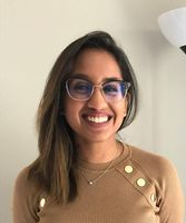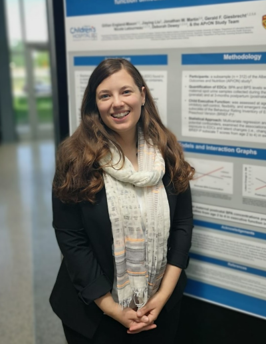The MiNDS of our Alumni
Author: Shawna Thompson
We caught up with two of our accomplished graduates, Roohie Sharma and Gillian England-Mason, to talk about their diverse careers in neuroscience. From careers and COVID-19, to law degrees and self-care, these alumni have valuable advice for students at all stages of their graduate studies!
1. Roohie Sharma, MSc – Current Position: Articling Student (Law)

Q: What is your current position? Can you give us a brief description of things you might do on a daily basis as part of your job?
I am currently an articling student, which is a practical placement before you get called to the bar (the final step toward becoming a lawyer). There are a lot of different options, and these vary from firm to firm, but I work at a full-service firm downtown doing corporate work. Of relevance to MiNDS, I get to do a lot of intellectual property (IP) law, which focuses on pharmaceutical patents. Day-to-day, I am doing a lot of legal research and drafting a lot of documents. The bulk of IP law is pharmaceutical companies and drug patent work. For example, if a generic drug manufacturer wants to sell a drug, they might claim that a patent is no longer valid, while the pharmaceutical company holding the patent wants to keep it. This could come down to millions of dollars for a single drug! I was just on secondment for 2 months and it was a really great experience! I was working in-house at a pharmaceutical company to experience what it's like to do that kind of law. Since I've been back at the firm, I’ve been working on an upcoming IP trial, which is an amazing experience
Q: Did your graduate studies in neuroscience help you get your current position?
Yes! In the interview I said that I did my masters in neuroscience. I use my science knowledge all the time, although there are many options in law that wouldn't rely on scientific knowledge.
Q: How have you had to adapt during the COVID-19 pandemic, and what do you like to do in your time off or for self-care?
Everything is remote now, as you can see with my little three-screen setup here. I've been getting used to a lot of Zoom meetings, Zoom coffees and catch-ups, and online instructions. In my spare time, I keep in touch with a lot of people by FaceTime. Recently I've watched Bridgerton on Netflix, and I'll always re-watch New Girl. I also adopted a cat during the pandemic and spend time with him too!
Q: What were your favourite parts of graduate school at McMaster?
I liked the research a lot. I also really appreciated the collaborative nature of my lab. The mentorship I got from Dr. Mishra means a lot to me, and it’s something I think about often.
Q: Are there any skills or knowledge that you learned as a graduate student that you use in your current work?
My science knowledge, critical thinking abilities, and research skills are big ones. Teamwork and collaboration were also very important things I learned in graduate school. If I was going through my interviews, I'd have all kinds of things for you, but right now there's so much legal knowledge burying it all.
Q: If you could go back to your time in the Neuroscience Graduate Program at McMaster, would you do anything differently? What advice would you give to current graduate students interested in following a similar career path?
I don't think that I'd do anything differently. I would tell someone interested in following in this career path to think really hard about what you want to be spending your time doing. Is law something you really want to do? Think really hard about what skills you have and what kind of activities you enjoy spending your time doing that uses those skills. Think about your future in that way.
Q: Have you discovered any career paths for neuroscience graduate students that you might not have been aware of earlier in your career?
Law! I didn't think that I'd use my background as much as I do. If it's something you're interested in doing, I took a fantastic Neuro Law class with Dr. Ambrosini while I was a graduate student. It was a great way to learn about how I could combine my interests.
2. Gillian England-Mason, PhD – Current position: Postdoctoral Fellow

Q: What is your current position? Can you give us a brief description of things you might do on a daily basis as part of your job?
I am currently a postdoctoral fellow in the Department of Pediatrics at the University of Calgary. I am part of the Owerko Centre at the Alberta Children's Hospital Research Institute, where my research examines how genes, neurobiology, and environmental factors affect neurodevelopment in early childhood. On a daily basis you can find me participating in Zoom calls with colleagues across the country, working with large datasets, and mentoring students on independent projects. I am very fortunate to be in the analysis stage of most of my projects at the moment, and I really enjoy working from my home office as it is in close proximity to our espresso machine.
Q: Are there any skills or knowledge that you learned as a graduate student that you use in your current work?
As a graduate student in the neuroscience program, I learned the importance of multidisciplinary research and collaboration. The program brings together students from a diversity of subfields. I really enjoyed having the opportunity to connect with other students and learn about the different techniques and approaches they used in their projects. This appreciation and knowledge of basic and clinical research still benefits me to this day.
Q: If you could go back to your time in the Neuroscience Graduate Program at McMaster, would you do anything differently? What advice would you give to current graduate students interested in following a similar career path?
I would encourage current graduate students to seek out opportunities outside of their specific project. Whether this means joining the Out of Our MiNDS outreach team, volunteering as a judge at the Bay Area Science and Engineering Fair (BASEF), seeking out external coursework or collaboration, or something else entirely. The program offers students the flexibility to explore and tailor their experience. The year(s) in the program will really be what you make of them. These kinds of supplementary activities can be a great way to uncover a new passion and diversify your skillset.